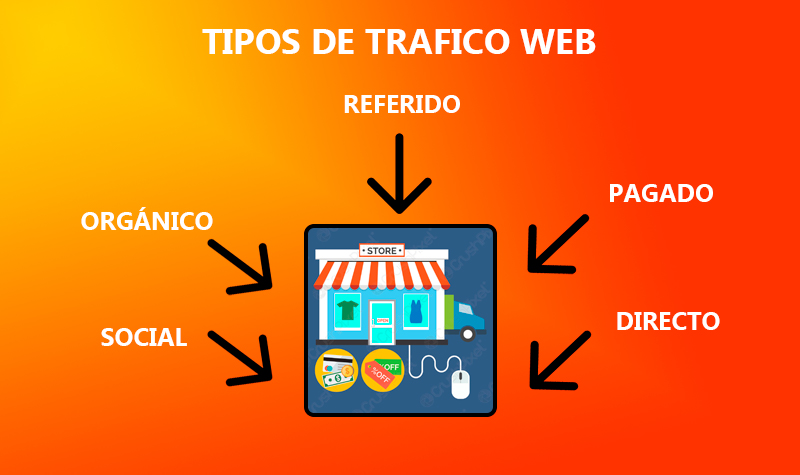SEO is the acronym for Search Engine Optimization , and refers to the optimization of a website for search engines. It is a set of actions and techniques aimed at improving the positioning of a web page in the search results of the main search engines, such as Google, Bing or Yahoo.
Article index
The objective of SEO is to increase the organic traffic of a website, that is, the number of visits a site receives through the search results of a search engine. To do this, a series of techniques and strategies must be used to help improve the positioning of a website in search results.
What is SEO?
SEO is not an exact science, and the results obtained may vary depending on various factors, such as competition, market niche or the search engine itself. However, SEO is a very important discipline for any company that wants to be successful on the Internet, since good positioning in search results can mean a significant increase in web traffic and, therefore, sales or conversions.
Where does the term SEO (Search Engine Optimization) come from?
The term SEO comes from English and literally means » search engine optimization . « That is to say , it is a set of techniques that allows the positioning of a website to be improved in the search results of a web search engine . com or Google . Optimizing a website for search engines is important because it allows the website to be more visible to the public . In this way , more traffic can be attracted and , therefore , more potential customers .
Optimizing a website for search engines can be done for free or by paying a fee . Free optimization techniques include using relevant keywords and creating high – quality content . Payment optimization techniques include paying for Google ads and using sponsored links . The latter is known as SEM.
How does SEO work for companies?
SEO is a very important discipline for any company that wants to be successful on the Internet. In fact, good positioning in search results can lead to a significant increase in web traffic and, therefore, sales or conversions.

To do this, a series of techniques and strategies must be used to help improve the positioning of a website in search results. Next, let’s see some of the main ones:
- Use the right keywords: It is very important to use the right keywords on each page of a website. These are the words or phrases through which a user can reach a website through a search engine. Therefore, it is important to use the appropriate keywords in the title, content, and image tags, among others.
- Make the website responsive: more and more users access the internet through mobile devices, such as smartphones or tablets. Therefore, it is important that a website is responsive, that is, that it adapts correctly to any device. In this way, the user experience is improved and access to information is facilitated.
- Use optimized titles and descriptions: Titles and descriptions are two very important elements for positioning in search results. Therefore, it is important to use optimized titles and descriptions, that is, they include the appropriate keywords.
- Create quality content: content is a fundamental element for positioning in search results. Therefore, it is important to create quality content, that is, original, relevant and correctly optimized content.
- Make the website easy to navigate: It is important that a website is easy to navigate, as a good user experience makes it easier to access information and improves ranking in search results.
- Use linkbuilding techniques: linkbuilding is an SEO technique that consists of creating quality links to a website. Quality links are those that come from quality, relevant websites.
- Make the website secure: It is important for a website to be secure, as a secure website improves ranking in search results and facilitates user trust.
Use tracking tools: It is important to use tracking tools, such as Google Analytics, to monitor web traffic and positioning in search results.
Why is SEO important for companies?
SEO is a very important discipline for any company that wants to be successful on the Internet. In fact, good positioning in search results can lead to a significant increase in web traffic and, therefore, sales or conversions.
Therefore, it is important to use a series of techniques and strategies that help improve the positioning of a website in search results. Next, we are going to see some of the main advantages of SEO for companies:
- Increased web traffic: the main objective of SEO is to increase the organic traffic of a website, that is, the number of visits a site receives through the search results of a search engine.
- Improved visibility: Good positioning in search results improves the visibility of a website and makes it easier for users to find it.
- Greater trust: a website well positioned in search results is usually perceived as more trustworthy and secure.
- Greater ROI: SEO usually has a good ROI, since the results obtained are usually much higher than the initial costs.
What are the factors of SEO?
SEO is a marketing strategy that focuses on optimizing a website to make it more visible in search engine search results (SERP). The goal of SEO is to increase quality traffic to a website, which results in a higher number of conversions.
Although SEO may seem like a complicated science, it is actually quite simple to understand. In its most basic form, SEO is a set of practices that aim to improve the quality and quantity of a website’s traffic.
To achieve this, SEO focuses on search engine ranking factors, which are the criteria that search engines use to determine which websites should appear in search results for a given keyword.
Although there are hundreds of ranking factors, some of the most important are the following:
- The quality of the content
- The relevance of the content
- The popularity of the site
- The structure of the site
- The user experience
Each of these factors is discussed below.
The quality of the content
Content quality is probably the most important SEO factor. The content of a website must be interesting, useful and relevant to the site’s target audience.
Additionally, the content should be well written and structured so that it is easy to read and navigate. Search engines also look for duplicate content, so it is important to ensure that the content on a website is unique.
The relevance of the content
Content relevance refers to how a website’s content relates to the keyword for which the site is being optimized.
For example, if a website is optimized for the keyword “dog food,” all content on the site should be about this topic. Otherwise, search engines will not consider the website relevant to the keyword and will not index it in search results.
The popularity of the site
Site popularity is another important SEO factor. More popular websites are more likely to rank better in search results.
The popularity of a website is measured in terms of inbound links, which are links pointing to a website from other websites. Inbound links are important because they are an indicator of the quality of a website’s content.
Websites with a high number of high-quality inbound links are considered more popular and are therefore more likely to rank better in search results.
The structure of the site
Site structure is another important SEO factor. The structure of a website should be clear and logical, and each page on the site should be linked appropriately.
Search engines use the home page link to crawl and index the content of a website, so it is important to ensure that all pages are linked correctly.
The user experience
User experience is another important SEO factor. Websites that provide a good user experience are more likely to rank better in search results.
User experience is measured in terms of a website’s ease of use, content quality, and page loading speed. Websites that are easy to use, fast, and have high-quality content provide a better user experience and are therefore more likely to rank better in search results.
The best tools for SEO
Currently, search engine positioning is one of the main digital marketing strategies, and SEO is the key to achieving it. However, success in this task is not always easy, as it requires a lot of effort and dedication.
But don’t worry, because in this post we are going to give you some tips to improve your positioning, and we are also going to present you the best tools for SEO. Keep reading!
Tips to improve search engine positioning
Search engine positioning is a complex task, which requires many factors to achieve a good result. Here are some tips that will help you improve your positioning:
- Choose a good domain: the domain is the name of your website or blog, and it is very important that it is short, easy to remember and that it has a good extension (.com, .net, .org, etc.).
- Optimize the content: the content of your website must be optimized for search engines, that is, it must contain the appropriate keywords and be well structured. In addition, the content must be of quality and of interest to users.
- Create a good structure: the structure of your website is very important for SEO, since it must be clear and simple. Likewise, the structure must be optimized for search engines, so that they can index your website correctly.
- Choose a good hosting: hosting is the place where your website is hosted, and it is important that you choose a quality one so that your website has good performance.
- Do link building: link building is an SEO technique that consists of creating quality links to your website from other websites. This improves search engine positioning, since links are an important ranking factor.
- Use social networks: social networks are a very powerful channel to disseminate the content of your website and improve positioning. Likewise, social networks serve to interact with users and create a community around your brand.
- Measure and analyze: It is important to measure and analyze the results to know if the SEO strategies are working. To do this, you can use web analysis tools such as Google Analytics.
Tools to do SEO
Next, we present the best tools for doing SEO. These tools will help you track your positioning, analyze your website, find keywords, do link building, etc.
- Google Search Console: is a free Google tool that allows you to track your search engine positioning. Additionally, it helps you detect and fix indexing problems, such as 404 errors.
- SEMrush : It is a very complete tool for SEO, as it allows you to carry out a detailed analysis of the website. Likewise, SEMrush helps you find keywords, do link building, etc.
- SE Ranking – web application that allows users to track their position in the search results of Google and other search engines. It also offers tools to analyze website performance and competition.
- Ahrefs: it is one of the best tools for SEO, since it allows you to carry out a complete analysis of the website. Ahrefs also helps you find keywords, do link building, etc.
- Moz: It is one of the best tools for doing SEO, as it offers a large number of tools and resources. Moz also helps you find keywords, do link building, etc.
- Google Keyword Planner: is a free tool from Google that allows you to find the best keywords for your website.
- Google Trends: is a free Google tool that allows you to analyze the performance of a keyword in search engines.
- Majestic: is a link building tool that allows you to find and analyze quality links to your website.
- BuzzSumo: is a tool that allows you to find the most popular content on social networks.
- Hootsuite: is a free platform that allows you to manage your social networks.
- Canva: is a free tool for designing graphics and images.
- Google Analytics: is a free Google tool that allows you to measure and analyze your website traffic.
How to choose your SEO agency?
With so many SEO agencies on the market, how can you choose the best one for your business? It is not an easy decision, as all agencies promise incredible results. However, not all agencies are the same and some are better than others. Here are some tips to help you choose the ideal SEO agency for your business.
1. Define your objectives
Before looking for an SEO agency, you should be clear about your objectives. Do you want to improve your positioning in search engines? Do you want to increase your website traffic? Do you want to generate more leads or sales? Defining your goals will help you find an agency that specializes in the type of service you need.
2. Do some research
Once you’ve defined your goals, it’s time to do some research. Read online reviews, visit agency websites, and contact them for more information. This will help you get a better idea of what each agency offers and whether it is a good fit for your business.
3. Ask about the price
Price is an important factor to consider when it comes to choosing an SEO agency. You don’t want to overpay for services, but you also don’t want to skimp on the budget. Look for an agency that offers a good price for the work they will do.
4. Ask for references
A good agency should be willing to provide you with references from other clients. This will help you get a better idea of the quality of the work they do. Additionally, if you talk to other clients, you can ask specific questions about their experience and whether they would recommend the agency.
5. Consider the quality of the service
The quality of service is another important factor to consider. Make sure the agency you choose has a good track record of providing results for their clients. Also, make sure that the agency has a good team of professionals who can answer all your questions and help you achieve your goals.
6. Ask about follow-up
A good SEO agency will not only help you achieve your goals, but will also provide follow-up after the work has been completed. This will help you ensure that the work is being done correctly and that you are seeing the results you expected.
Following these tips will help you find the ideal SEO agency for your business. Take your time to research several agencies and be sure to consider all of the factors mentioned. If you take your time and choose carefully, you will find the agency that best suits your needs and helps you achieve your goals.
How to develop an SEO strategy for my website?
SEO (Search Engine Optimization) is an important part of any digital marketing strategy. It consists of optimizing your website and its content to improve positioning in the search results of search engines (mainly Google).
Although SEO may seem like a complicated discipline, it is actually quite simple to understand and implement. In this article we will show you how to develop an SEO strategy for your website, step by step.
1. Identify your goals
What do you want to achieve with your SEO strategy? Do you want to improve the positioning of your website in search results? Do you want to increase organic traffic to your website? Do you want to improve the user experience of your website?
Identifying your objectives will help you focus your strategy and measure its results.
2. Identify your audience
Who are your users? What interests you? What do you need? How do they address you? Identifying your audience will help you better understand what content you should create and how you should optimize your website to serve their needs.
3. Conduct keyword research
What keywords will your users use to find your website in search engines? Conducting keyword research will help you identify the terms and phrases you should use on your website and in your content to improve your site’s ranking.
4. Optimize your website
Once you have identified the keywords you should use, it is time to optimize your website so that search engines can find and index it correctly.
This includes optimizing your site structure, titles, and content. You should also make sure that your website is optimized for mobile devices.
5. Create quality content
Content is an important factor for search engine positioning. You need to make sure you create quality content that is relevant to your users and is optimized for the keywords you have identified.
6. Promote your content
Once you’ve created your content, it’s time to promote it. This includes creating a link building strategy to get other websites to link to your content. You can also use social media to promote your content and reach more people.
7. Measure and analyze the results
Last but not least, it’s time to measure and analyze the results of your SEO strategy. This will help you understand what works and what doesn’t and will allow you to improve and optimize your strategy for better results.
In summary, SEO is a very important discipline for any company that wants to be successful on the Internet. In fact, good positioning in search results can lead to a significant increase in web traffic and, therefore, sales or conversions.










